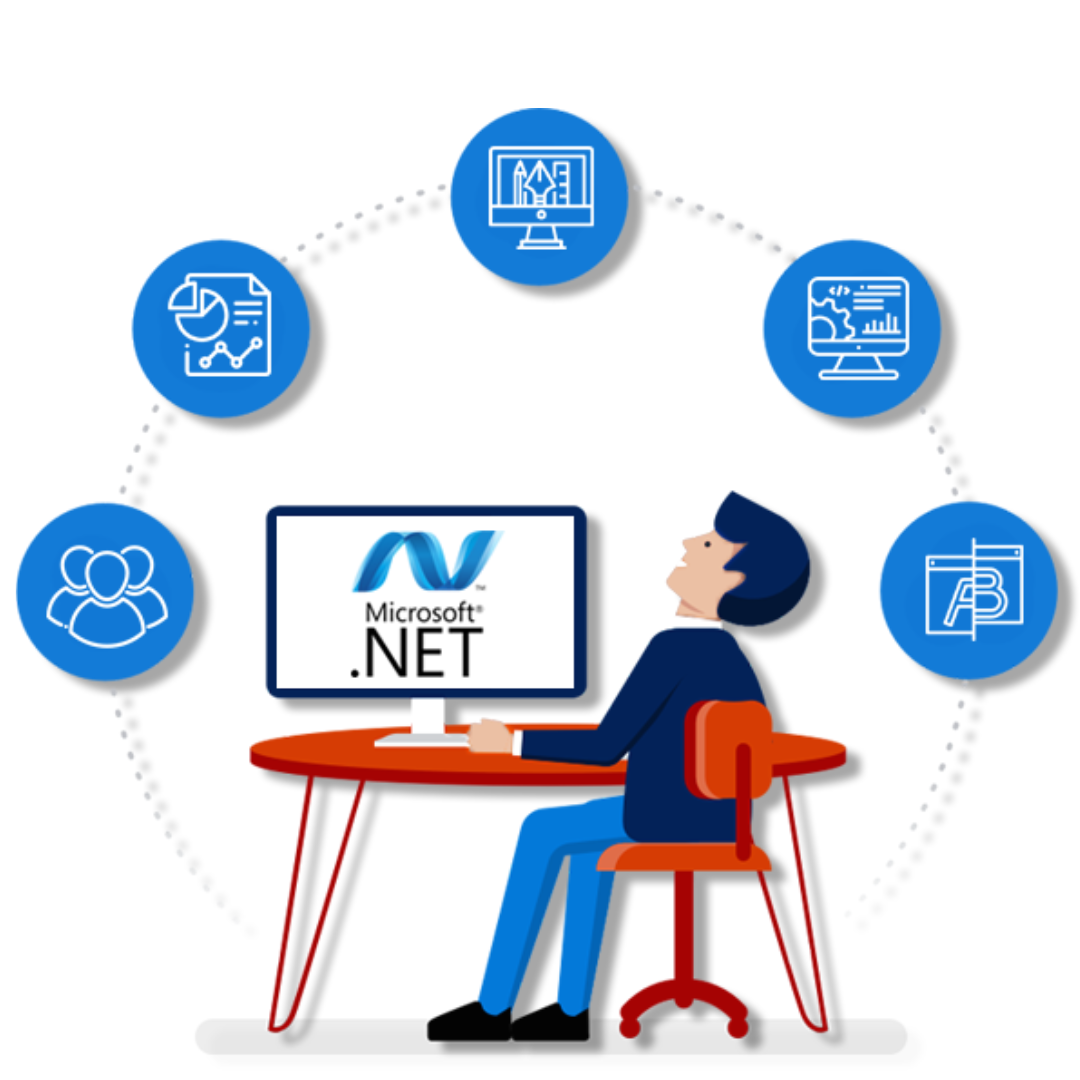Top Reasons to Choose ASP.NET Core for Enterprise Web App Development
You have a business and need an application for it – what technology would you choose to develop it? We will get to know ASP.NET Core for Enterprise Web Application Development.
Ever thought about it?
Let’s say – you have to make an online site for your business like an E-commerce website ………………..
Which one would you choose – Shopify, Drupal Commerce, Magento or something else that you can google, install, do a little customization and start using it?
Which one?
What if you need to develop an application faster? What technologies can help you develop an application faster than others?
Can you decide on your own?
Well – you are evaluating your options with what these lines just threw at you – isn’t it?
So, what do you think happens when a Big Business like an Enterprise has to make a business application for their business?
Can they choose a technology on their own?
Obviously not!
But there is something that you need to know – form the past 8-9 years a significant technology had gained traction and success – when it comes to powering applications for Enteprises.
What is the name?????????
ASP.NET Core!
Yes – you read it right!
Over the years ASP.NET Core, a framework by Microsoft, has powered many business applications and has gained popularity for the stability and seamless functionality that it can provide to an application that serves the role of a business application for enterprises.
But why – Let’s find out!
8 Reasons to Choose ASP.NET Core for Enterprise Web App Development
- For Performance & Scalability
High Performance –
ASP. NET Core is fast p- this is an attribute that is recognized by many developers out there. It is designed in a modular way, Kestrel Web Server so the application has a big improvement in speed compared with other versions of ASP. NET. That high performance is provided with the help of different optimizations such as just-in-time (JIT) compilation and high-level runtime performance optimization.
Scalability –
In today’s complex business world, rangeability is one of the most important factors. ASP. NET Core has horizontal scaling, this is; applications are easily able to manage increased loads. Whether one is using the concept of scaling out across many servers or opting for cloud solutions, ASP. Another consequence of NET Core’s architecture is that solutions that use it can be scalable without additional configuration.
- Cross-Platform Compatibility
Run Anywhere –
Unlike its predecessors, ASP. NET Core is cross-platform. It is compatible with Windows, Linux, as well as the newer macOS which makes it quite flexible when it comes to the environments in which it can be deployed in. This provides it to be used with multiple operating systems and is therefore ideal for organizations with different operating systems and wanting to guarantee an iterative development experience.
Deployment Flexibility –
With ASP.NET Core applications, ASP.NET Development Company can deploy their solutions to various environments, including an organization’s local server and cloud platforms like Microsoft Azure, Amazon Web Service, and Google Cloud Service. This flexibility in deployment planning empowers businesses to select the most suitable model that aligns with their financial capabilities.

- Modern Development Practices
MVC Architecture –
ASP. NET Core uses the Model-View-Controller (MVC) architecture. This is a way of structuring the application that decomposes concerns and therefore brings out order and cleanliness. This architecture brings modularity and hence the ability to easily maintain and test the application, qualities desirable for enterprise applications.
Dependency Injection –
DI, an attribute of ASP. NET which is pre-installed. As for service lifetime and dependencies’ management, NET Core has it more facile. This feature makes the application loosely coupled, hence very easy to test and very easy to maintain an application that is rich in functionality.
Razor Pages –
Razor Pages came with the ASP. NET Core allows the seemingly effortless creation of more interactive web pages. They give a page focused design that makes it easier to work with because a lot of logic and markup is tied to the page than dealing with complicated controller operations.
- Robust Security Features
Built-in Security –
ASP. NET Core is also secure with features such as data protection which involves storage, authentication, and authorization. It supports commonly used specifications including OAuth and OpenID connect by which a user can safely authenticate/authorize.
Regular Updates –
Microsoft, for instance, continually updates, and provides security patches for ASP. NET Core. This kind of support aids in safeguarding applications from various threats and guarantees that they are developed conforming to the current known security requirements.
Middleware for Security –
ASP. Some of the middle piece’s present in the NET Core framework are related to security issues like cross site request forgery protection of content, security policy for content and implementation of the HTTPS. These built-in features help protect the applications from different threats on the internet.
- Highly Favored by Productive Developers
Rich Ecosystem –
ASP. NET Core has a large and extensive library, tools and extensions in its environments. The .NET ecosystem comprises of pre-constructed elements that can certainly expedite the development process.
Visual Studio Integration –
Visual studio IDE is developed with deep integration with ASP from the software giant Microsoft. ASP, being a part of the .NET family, is supported by NET Core, and some of the benefits can be debug, profiling, and code analysis. It also reinforces efficient development and consequent productivity among computer developers.
NuGet Package Manager –
.NET community is a fine example of such a tool. Thus, to effectively manage all these libraries, Microsoft created the package manager called NuGet. NET simplifies dependency management. Third-party packages are easy to include in an application since there is a wide collection to import from, which saves on time and effort.
- Open-Source Nature & Community Support
Open Source –
ASP. NET Core is open source. This lets the developers get the source code and even contribute to it and even modify it according to their preference. Thanks to this openness, the work on the improvements becomes easy and transparent and any peculiarities specific to an enterprise can be addressed more easily.
Active Community –
ASP. Many people work on NET Core and contribute to its development. This active community offers multiple resources such as forums, blogs and tutorials that assist developers to overcome problems and even learn modern techniques of development.
- Great Integration Capabilities
Cloud-Native Capabilities –
ASP. NET Core is cloud-optimized with key characteristics of cloud-native applications. This relates well with other cloud technologies such as Microsoft Azure where it supports facilities such as cloud storage, serverless computing and utilization of Kubernetes in organizing containers.
Microservices Architecture –
ASP. NET Core also supports microservices architectural style for the enterprises with aim to develop the independently deployable systems. This makes it easier to develop intricate applications and to scale and improve modularity and redundancy of complex applications.
API Development –
ASP. NET Core is very useful when it comes to constructing RESTful APIs. Due to JSON serialization, routing and middleware, it is suitable to use this framework to build APIs which interact with web and mobile applications.
- Cost Effective Technology
Low Licensing Costs –
Being open source, ASP. NET Core removes the need to purchase licenses when using framework protected by copyrights. It is more advantageous in this aspect considering that this approach is especially suitable for startups and SMBs since they have to slash down on expenses.
Efficient Resource Utilization –
ASP.NET Core’s performance enhancements and scaling properties contribute to cutting infrastructure expenses. Resource management brings down the host and operating costs, which are decreased to improve the total economy.
Conclusion
ASP.NET Core is such a framework which is powerful, versatile and relatively more affordable option for the development of enterprise web applications.
It is performance-oriented, compatible with cross-platform, developed using modern practices, comes with strong security measures, and is open for adopting superior technologies, making it perfect for organizations that crave for greatness in terms of developing scalable, secure, and high-performance web applications.
By leveraging ASP.NET Core, enterprises can advance their development processes and gain higher efficiency levels in addition to protecting their applications from risks linked with the tendency of the further evolution of technologies.
If you are planning to venture into a new web app development project, then, ASP.NET Core is worth considering!
ASP.NET Core stands out as a modern and reliable web application development platform, making it an excellent choice for enterprise applications. With advantages such as performance, scalability, cross-platform capabilities, and security, it is ideal for meeting business needs. If you are looking for the best tools for enterprise web app development, Top Reasons to Choose ASP.NET Core for Enterprise Web App Development will be the right choice for you.
